| CONVENTION WRAP | |
August 14, 2000 |
|
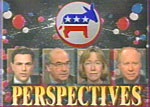
|
Our panel of historians, followed by Mark Shields and Paul Gigot, preview the first day of the Democratic National Convention.
|
|
JIM LEHRER: Some overview perspective on what is happening here at this Democratic Convention, and to Gwen Ifill.
GWEN IFILL: Doris, what do you think about the way that Bill Clinton is exiting the stage?
GWEN IFILL: Michael? MICHAEL BESCHLOSS: As tough as it may look for Gore with Clinton, you know, a worst case is Lyndon Johnson in 1968. And I love many things about Lyndon Johnson, but not the way he treated Hubert Humphrey at that Democratic Convention in 1968. He basically said to Humphrey, "You get away from me on the Vietnam War. I'm going to dry up every Democratic dollar between Maine and California." And he really meant it. At that convention, Humphrey was able to negotiate a compromised plank between the anti-war people and the Johnson people. Even the secretary of state, Dean Rusk, supported it. Johnson called up Humphrey from Texas and said I'm not accepting this; if you get away from me, I'm going to make your life miserable, and he did for the next month and a half. GWEN IFILL: David, this is different, obviously in this case, because these two were such close working partners, Clinton and Gore, that it makes it even more awkward in some ways.
|
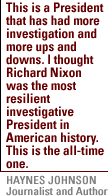 |
||||||||||||||||||
| The most resilient president in history | ||||||||||||||||||||
|
GWEN IFILL: Haynes, we heard Jimmy Carter, who was a relatively young President when he left the stage, we heard him say, just give it up already, just get out of the way.
GWEN IFILL: Will the personal scandals of the past couple years make this more difficult for Gore to separate himself out and more difficult for Bill Clinton to leave?
MICHAEL BESCHLOSS: But the problem is that he's got a different view from Gore about how much Bill Clinton should be in this campaign. Clinton looks at his poll ratings and says, basically, the more I am out on the stump, the more my popularity is going to be transferred to Al Gore. Al Gore and his people don't quite see it that way. They think perhaps a little less Bill Clinton might go a long way. And the problem is, I think what you're going to see is for the next couple of months, Clinton basically champing at the bit saying I want to do this for you, Al, I want to do that for you, Al, and the Gore people having to very, very gently make sure this is done a lot more subtly than Clinton intends. DAVID GERGEN: I'm told that the President and his wife both feel hurt personally by some of the comments of the Gore people, that they feel they have not been appropriately appreciated. After all, he has delivered a 5% economy; it's roaring along; he's got an 11000 Dow; he's got peace over eight years. He's delivered more to Al Gore than almost any candidate I can remember who has been running in Gore's position. And by all odds, Gore should be ahead. Instead, what the President I think feels is, why is Al Gore running so far away from me? I understand he has to establish his independence, but this is quite different from the way George Bush treated Ronald Reagan. In 1988, that election was Reagan III. When George Bush got elected, that was Reagan III. This is very different. They are intentionally on the Gore people's part saying we don't want this to be Clinton III; we want this to be Gore I. And there's a big, big difference.
GWEN IFILL: Well, let's - compare for me the difference between what happened in Ronald Reagan passing on the baton to George Bush - you know - Ronald Reagan III - and this case. What's so different about this? DORIS KEARNS GOODWIN: Well, you know, the interesting thing, in some ways I think Reagan was more ready to go off into the sunset, just as you said, because of his age, and also because he was leading in popularity without that scandal behind him. There wasn't still enough to be sort of made up for. But I think also the interesting thing is Reagan hardly mentioned, if I remember correctly, he didn't really mention Bush very much in his final speech. So his popularity didn't help him as much as it might have. Similarly, I don't think Eisenhower did as much for Nixon as he might of. Nixon didn't want him to help, because Nixon wanted to do it on his own, and then later he wished, oh, my God, I wish I had had that popular man. So, that's the flip side. I think the popularity of Clinton can help Gore. It's a complicated thing here.
HAYNES JOHNSON: And there's an exquisite problem for Al Gore. He's got to turn on the voters. That's the one thing that nobody can disagree - Bill Clinton does do. So you're going to need him to do that. GWEN IFILL: He turns on the base. HAYNES JOHNSON: That's what I'm talking about - I mean, the Democratic base to reach out. MICHAEL BESCHLOSS: And the fund-raisers. HAYNES JOHNSON: And the fund-raisers. So he needs... Al Gore needs Bill Clinton, and he also wants him to go. |
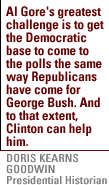 |
|||||||||||||||||||
| Rebutting the Republican argument | ||||||||||||||||||||
|
GWEN IFILL: We're going to miss those Arkansas references. DAVID GERGEN: We're going to miss those Arkansas references. GWEN IFILL: Too late to worry about it. What is the way to do this right? How do you do this right? HAYNES JOHNSON: There isn't a right way. I guess you could get on a plane and go off. Reagan did it easily but he was older. He saluted, he got on the helicopter. He was flying off, one fly around, do you remember, David? DAVID GERGEN: Yes. HAYNES JOHNSON: Looking down the helicopter. He was gone. DAVID GERGEN: But they did... There was a conversation between the Clinton people and the Reagan people about how they did it. They checked with each other, and what Reagan did was on the Tuesday morning of his convention he went to the tarmac, left the convention, met George Bush at the tarmac and made a grateful statement and they went off. That is now the model of what the Clinton and Gore people are using - it's a Tuesday handoff. Originally Bill Clinton wanted to speak here on Tuesday night, and the Gore people thoughts that's too late in the convention. I think come Monday night and thank you very much and good-bye.
DORIS KEARNS GOODWIN: Al Gore's greatest challenge is to get the Democratic base to come to the polls the same way Republicans have come for George Bush. And to that extent, Clinton can help him. I think, how do you do it right? I think if you had asked Clinton to come maybe last night and speak tonight and do his thing and go away. It's the fact that he's been here for several days; that he was in the news with that speech to the preachers that just gobbled up the attention in the last couple days. But how do you tell him don't do that? MICHAEL BESCHLOSS: Even the fact this convention is here in Los Angeles, this is what he's wanted for years. He watched the Los Angeles convention of John Kennedy in 1960 as a boy, loved it, tried to get it here in 1996, couldn't do it. So everyone who's here knows that the reason we're all in Los Angeles is not Al Gore but Bill Clinton.
HAYNES JOHNSON: I was going to say, it's so interesting. Jimmy Carter said he has 25 years left to live. He was talking about Bill Clinton. Clinton's the third youngest President in our history. And so this is... this is a really psycho-drama more than a presidential political one. DAVID GERGEN: We're not going to use up all the responsibilities on Bill Clinton. I think Al Gore needs to do more to get his people to shut up about taking shots at Clinton, and frankly, I think he ought to show more pride in the Clinton administration; he ought to be shoulder to shoulder about all the progress we've made and say we've come a heck of a long way, yes, he made some mistakes, by God, we're the only people that can continue it. GWEN IFILL: We're going to leave it there for now and pick it up again later. Thank you all very much. |
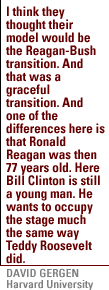 |
|||||||||||||||||||
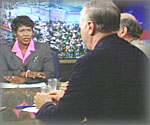 GWEN
IFILL: We get that from NewsHour regulars Presidential historians Doris
Kearns Goodwin and Michael Beschloss, and journalist and author Haynes
Johnson. Joining them tonight is David Gergen, who served in the Clinton
and Reagan administrations; he is now an editor at large at U.S.
News & World Report, and teaches at the Kennedy School of
Government at Harvard University. Welcome, everyone.
GWEN
IFILL: We get that from NewsHour regulars Presidential historians Doris
Kearns Goodwin and Michael Beschloss, and journalist and author Haynes
Johnson. Joining them tonight is David Gergen, who served in the Clinton
and Reagan administrations; he is now an editor at large at U.S.
News & World Report, and teaches at the Kennedy School of
Government at Harvard University. Welcome, everyone. 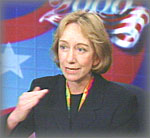 DORIS
KEARNS GOODWIN: Very, very slowly. He reminds me most of President Teddy
Roosevelt, who they said about Teddy Roosevelt that he wanted to be
the baby at the christening, the bride at the wedding and the corpse
in the funeral. He had to have center stage. And he actually even more
than Clinton, he actually wrote Taft's acceptance speech. He gave him
all sorts of advice. Only stay in hotels. Let the people see you. Don't
stay in private houses. Don't ever be photographed on a horse because
you're too fat, 350 pounds. Never be seen playing golf because it's
not a working man's game. So he felt that he couldn't get off the stage,
and it hurt Taft. I mean, it made him hard to establish his own. I think
he could go with grace now. There will still be time. His presidency's
not over; it's only in the twilight. He has five more months left to
raise his funds, to do what he wants to do. I would say classily go
away for a little while.
DORIS
KEARNS GOODWIN: Very, very slowly. He reminds me most of President Teddy
Roosevelt, who they said about Teddy Roosevelt that he wanted to be
the baby at the christening, the bride at the wedding and the corpse
in the funeral. He had to have center stage. And he actually even more
than Clinton, he actually wrote Taft's acceptance speech. He gave him
all sorts of advice. Only stay in hotels. Let the people see you. Don't
stay in private houses. Don't ever be photographed on a horse because
you're too fat, 350 pounds. Never be seen playing golf because it's
not a working man's game. So he felt that he couldn't get off the stage,
and it hurt Taft. I mean, it made him hard to establish his own. I think
he could go with grace now. There will still be time. His presidency's
not over; it's only in the twilight. He has five more months left to
raise his funds, to do what he wants to do. I would say classily go
away for a little while.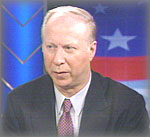 DAVID
GERGEN: I think this transition has been much more awkward than any
of us might have anticipated three months ago or six months ago because
they were joined at the hip. Al Gore had come out in such a fulsome
way during the impeachment proceeding to support his President. And
yet, now there's real tension between the staffs; there's acrimony between
the staffs below them. One has a sense they're not talking so well.
I think they thought their model would be the Reagan-Bush transition.
And that was a graceful transition. And one of the differences here
is that Ronald Reagan was then 77 years old. Here Bill Clinton is still
a young man. He wants to occupy the stage much the same way Teddy Roosevelt
did. And the Gore people feel, you're not giving us any space; there's
no breathing room here; there's no oxygen to breath because you've dominated
the stage here from -- essentially from the time that Al Gore beat Bill
Bradley almost until now. So coming into the convention, there's been
an enormous amount of attention - this is nothing like I think the Reagan-Bush
transition.
DAVID
GERGEN: I think this transition has been much more awkward than any
of us might have anticipated three months ago or six months ago because
they were joined at the hip. Al Gore had come out in such a fulsome
way during the impeachment proceeding to support his President. And
yet, now there's real tension between the staffs; there's acrimony between
the staffs below them. One has a sense they're not talking so well.
I think they thought their model would be the Reagan-Bush transition.
And that was a graceful transition. And one of the differences here
is that Ronald Reagan was then 77 years old. Here Bill Clinton is still
a young man. He wants to occupy the stage much the same way Teddy Roosevelt
did. And the Gore people feel, you're not giving us any space; there's
no breathing room here; there's no oxygen to breath because you've dominated
the stage here from -- essentially from the time that Al Gore beat Bill
Bradley almost until now. So coming into the convention, there's been
an enormous amount of attention - this is nothing like I think the Reagan-Bush
transition. 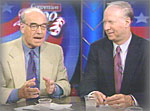 HAYNES
JOHNSON: Well, as Doris says, goes slowly. But he's not going slowly.
He's not going at all. But I think it's inevitable. There is nobody
in human history that has ever wanted to exit the stage easily -- or
even slowly. I mean, they love power, whether czars or kings or popes
or emperors -- Presidents no less. This is a President that has had
more investigation and more ups and downs. I thought Richard Nixon was
the most resilient investigative President in American history. This
is the all-time one. You have to understand, this guy is now at 62 -
64% approval rating after being impeached -- the only elected President
to be impeached. So I think it's human nature that he wants to share
the spotlight, at least hold the spotlight. But he will go.
HAYNES
JOHNSON: Well, as Doris says, goes slowly. But he's not going slowly.
He's not going at all. But I think it's inevitable. There is nobody
in human history that has ever wanted to exit the stage easily -- or
even slowly. I mean, they love power, whether czars or kings or popes
or emperors -- Presidents no less. This is a President that has had
more investigation and more ups and downs. I thought Richard Nixon was
the most resilient investigative President in American history. This
is the all-time one. You have to understand, this guy is now at 62 -
64% approval rating after being impeached -- the only elected President
to be impeached. So I think it's human nature that he wants to share
the spotlight, at least hold the spotlight. But he will go.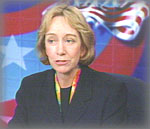 DORIS
KEARNS GOODWIN: I don't think they should. I mean, I think President
Clinton is absolutely correct in saying that it absolutely makes no
sense for anyone to blame Al Gore for, certainly for the moral scandal
of the Clinton White House. The fund-raising thing might be more complicated
because Gore is involved in that, as well. But I think that's all the
more reason to give Gore breathing space now. The thing that interests
me now is in the longs run for Clinton it's so important that Gore lives.
First of all, he's going to be living as a young man and to have Gore,
a friend in the White House, saying great things about him will make
his living life more, and his legacy will be so much better if it turns
out that some of the Democratic programs that Clinton cared about get
enacted. Kennedy and Johnson's legacy gets all mixed together. People
think Kennedy did some of the things Johnson did. So in the long run,
he'll be much more better served by having Gore win.
DORIS
KEARNS GOODWIN: I don't think they should. I mean, I think President
Clinton is absolutely correct in saying that it absolutely makes no
sense for anyone to blame Al Gore for, certainly for the moral scandal
of the Clinton White House. The fund-raising thing might be more complicated
because Gore is involved in that, as well. But I think that's all the
more reason to give Gore breathing space now. The thing that interests
me now is in the longs run for Clinton it's so important that Gore lives.
First of all, he's going to be living as a young man and to have Gore,
a friend in the White House, saying great things about him will make
his living life more, and his legacy will be so much better if it turns
out that some of the Democratic programs that Clinton cared about get
enacted. Kennedy and Johnson's legacy gets all mixed together. People
think Kennedy did some of the things Johnson did. So in the long run,
he'll be much more better served by having Gore win.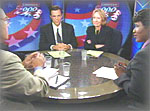 HAYNES
JOHNSON: That's a very important point. David. It was the third term
for Ronald Reagan. There's a reason why vice presidents don't usually
get elected when they try to run as vice presidents in the office. There's
only been once since the 1830s. That was George Bush. And this is a
very awkward. Americans like change. Whether you like it or not, Doris
is right, you think this man would want to be able to help him, and
his legacy is going to be whether his vice president wins. But it's
a very complicated personal relationship.
HAYNES
JOHNSON: That's a very important point. David. It was the third term
for Ronald Reagan. There's a reason why vice presidents don't usually
get elected when they try to run as vice presidents in the office. There's
only been once since the 1830s. That was George Bush. And this is a
very awkward. Americans like change. Whether you like it or not, Doris
is right, you think this man would want to be able to help him, and
his legacy is going to be whether his vice president wins. But it's
a very complicated personal relationship.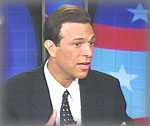 MICHAEL
BESCHLOSS: It's always hard to do and almost never works. You know,
Truman and Stevenson in 1952 -- Truman now is a great hero. In 1952,
he was very unpopular -- charges of corruption in the administration.
Stevenson wanted to distance himself fast, which he did, and there's
a letter in the Truman Library that Truman wrote to Stevenson full of
a couple of expletives. He finally didn't send it. But it just rips
the hide off of Stevenson and says, if you do not understand that you're
running at as the legatee of my administration, you're going to lose.
Same thing was true with Eisenhower and Nixon. Eisenhower never understood
why Nixon did not want to use him more.
MICHAEL
BESCHLOSS: It's always hard to do and almost never works. You know,
Truman and Stevenson in 1952 -- Truman now is a great hero. In 1952,
he was very unpopular -- charges of corruption in the administration.
Stevenson wanted to distance himself fast, which he did, and there's
a letter in the Truman Library that Truman wrote to Stevenson full of
a couple of expletives. He finally didn't send it. But it just rips
the hide off of Stevenson and says, if you do not understand that you're
running at as the legatee of my administration, you're going to lose.
Same thing was true with Eisenhower and Nixon. Eisenhower never understood
why Nixon did not want to use him more. 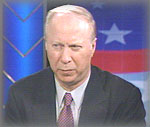 DAVID
GERGEN: What they're trying to do tonight is to use the Clinton speech
not to frame the election for what's coming, but to rebut the Republican
argument that all this prosperity happened by accident in effect, and
that it doesn't mean very much. I mean, Bill Clinton made the point
the other day, he said, if you find a turtle on top of the post, it
didn't get there by accident.
DAVID
GERGEN: What they're trying to do tonight is to use the Clinton speech
not to frame the election for what's coming, but to rebut the Republican
argument that all this prosperity happened by accident in effect, and
that it doesn't mean very much. I mean, Bill Clinton made the point
the other day, he said, if you find a turtle on top of the post, it
didn't get there by accident. 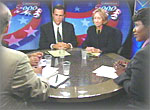 GWEN
IFILL: If you take -- trying to sweep Bill Clinton out of town before
he's ready to go - as it looks like the Gore people would be only so
happy to do -- don't you undercut yourself in the long run? I saw a
poll today that showed a huge group of people said they really don't
think it's a good idea... they would never vote for Al Gore no matter
what. How do you overcome that -- if you have a popular president who
can do something?
GWEN
IFILL: If you take -- trying to sweep Bill Clinton out of town before
he's ready to go - as it looks like the Gore people would be only so
happy to do -- don't you undercut yourself in the long run? I saw a
poll today that showed a huge group of people said they really don't
think it's a good idea... they would never vote for Al Gore no matter
what. How do you overcome that -- if you have a popular president who
can do something? 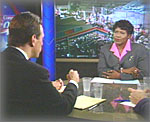 GWEN
IFILL: Go ahead.
GWEN
IFILL: Go ahead.